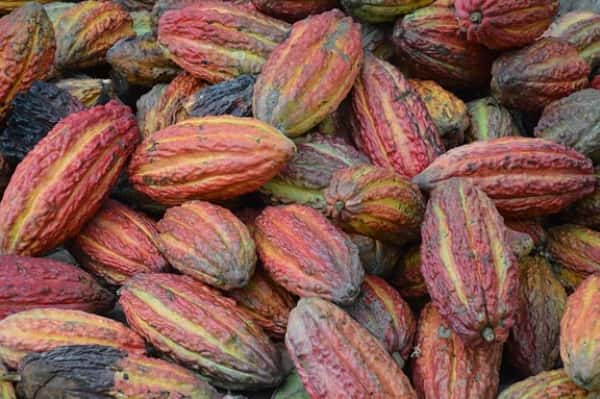It would be a great understatement to say that chocolate is delicious. This decadent, comforting, delectable, and all-round delightful treat is probably one of the top guilty pleasures ever known.
Chocolate unfortunately has a bit of a bad rep among health circles. It often falls under the category of “junk food” due to its sugar and fat content, and is often associated with obesity, diabetes, heart disease, and other health issues.
But is chocolate really that bad? Does it offer any benefits? (I mean, other than just its exquisite, joy-inducing flavour, of course).
Let’s take a look at chocolate, its active components, and how they may be beneficial to certain aspects of our health.
What is Chocolate Made of?

Chocolate is made from cacao beans. The seeds of the cacao tree are fermented, dried, and roasted into cocoa powder which is then used to make chocolate.
The percentage of cocoa is what determines what kind of chocolate it is – dark chocolate has the highest cocoa content with its characteristic bitter taste (the darker the chocolate, the higher the cocoa content), while milk and other chocolates have added sugar and fat to make them sweeter (and more delicious in my humble opinion).
Cocoa beans are rich in bioactive, polyphenolic compounds called flavanols, which are antioxidants that help reduce damage to cells.
Flavanols are the component of chocolate that may offer many health benefits.
Potential Health Benefits of Chocolate
1. Blood pressure
Research suggests that dark chocolate (i.e. chocolate with a high cocoa content) may be beneficial for cardiovascular health.
Several randomized controlled trials have shown that cocoa consumption may lower blood pressure and improve blood flow (1, 2).
How this works: Flavanols activate the synthesis of a molecule called nitric oxide in the body. Nitric oxide works to relax and dilate the arteries, allowing for easier blood blow and reduced blood pressure (3).
2. Cholesterol
Flavanols may also help regulate cholesterol levels, which can be beneficial for heart health as well.
Studies have shown LDL cholesterol- and total cholesterol-lowering effects from cocoa consumption (4, 5).
In one study, cocoa was shown to raise HDL cholesterol (often called the “good” cholesterol), lower LDL cholesterol (often called the “bad” cholesterol), and lower oxidized LDL cholesterol (even worse bad cholesterol) in participants with initially high cholesterol levels (5).
High LDL cholesterol levels are bad because they cause cholesterol build-up in the arteries which, over time, can increase the risk of cardiovascular incidents such as heart attack or stroke. Oxidized LDL cholesterol is even worse because it is more reactive and can cause damage and further blockage of the arteries (i.e. atherosclerosis). The antioxidant properties of cocoa help mitigate this oxidization of LDL cholesterol.
HDL cholesterol, on the other hand, is considered good because it carries cholesterol from around the body to the liver where it can be processed, reducing the chance of build-up.
3. Insulin resistance
In addition to improving the cardiovascular risk factors listed above, some studies suggest that dark chocolate may also help the body respond to insulin properly (4, 6).
One randomized controlled trial showed that the consumption of flavanol-rich dark chocolate (100g/day for 15 days) decreased insulin resistance, improved insulin sensitivity, and improved beta cell function in patients with impaired glucose tolerance (4).
It is important to note here that we’re talking about dark chocolate with high cocoa content – other chocolates with added sugar, such as milk chocolate, are likely to have the opposite effect as the added sugar will spike your blood sugar!
This improvement in insulin control has implications for reducing the risk of diabetes. However, studies looking into whether flavanol-rich foods such as chocolate can be used to help manage type 2 diabetes remain inconclusive due to limited clinical data (7, 8, 9).
4. Cellular damage
Because cocoa is rich in antioxidant flavanols, it is thought to perhaps protect against the cellular and genetic oxidative damage that can lead to cancer.
One study found that flavanol-rich chocolate consumption significantly prevented DNA damage and enhanced cellular integrity (10). These results were attributed to the high antioxidant (flavanol) content of the cocoa.
Its ability to regulate cellular stress, oxidative damage, and chronic inflammation, might make cocoa a potential cancer-preventative agent (11). However, the research on whether chocolate can play a role in cancer prevention is inconclusive and not well studied.
Other potential health benefits of chocolate:
Studies have suggested several other potential health benefits of cocoa, however results are mixed for the most part, and further study is still needed.
Some of the benefits that have been reported with weak evidence include:
- Cognitive function: cocoa consumption may be associated with improved cognitive performance (12), improve neurovascular coupling (13), and modify the progression of Alzheimer’s disease (14).
- Bone health: greater bone growth in adolescents consuming chocolate (15). However, in older women, chocolate consumption is shown to reduce bone density and strength (15, 16).
- Athletic performance: dark chocolate consumption may help improve athletic performance by reducing oxygen requirements (17).
How Much Chocolate Should You Eat?

Soooo….does this mean we should all start eating more chocolate?!
Unfortunately, despite the potential benefits listed above, chocolate is still far from being a health food. (I feel ya, fellow chocoholics…it really was too good to be true).
While cocoa is high in flavanols, you would need to eat high amounts of chocolate in order to reap the antioxidant benefits.
One scientific review concluded that to get the cardiovascular benefits (i.e. reduced risk of CVD) of chocolate, chocolate consumption should be kept under 100g/week, with the best amount being 45g/week (18). The researchers stated that higher consumption levels may cancel any potential health benefits as the high sugar intake can lead to adverse effects.
This means that we probably should not start eating chocolate to our heart’s content, in the hopes of…well, making our hearts content.
Essentially, you don’t want to be reaching for chocolate just for the antioxidants – plenty of other healthier foods are high in antioxidants. Foods like apples, grapes, red wine, tea, and berries are other great sources of flavanols. Chocolate is high in calories and tends to have added sugar and saturated fats, which makes it a less healthy option.
When it comes to the question of how much chocolate is too much, it depends a lot on the type of chocolate.
Dark chocolate with a high cocoa content will offer greater antioxidant benefits. Other chocolates such as milk chocolate have way more added sugar which is why chocolate is typically categorized as junk food. Excess sugar can lead to a whole slew of other health problems such as weight gain and associated health issues.
And as for white “chocolate”….well, it really shouldn’t even be called chocolate.
There is not really an established recommendation for how much chocolate or cocoa you should consume, so chocolate is probably best left as one of those foods you eat in moderation, as a little treat every now and then. Generally, 70% cocoa and up, high quality, dark chocolate is the best option.
The takeaway? — Perhaps use these potential health benefits to excuse yourself for eating a little pick-me-up wedge of chocolate every now and then, or to encourage you to swap other chocolates for dark chocolate, but not to encourage you to eat more chocolate!
Summary
Chocolate is made from cocoa beans which contain high levels of antioxidants called flavanols. Studies suggest that flavanols may offer benefits for blood pressure, cholesterol levels, insulin sensitivity, and more. However, further study is still needed. Dark chocolate with high cocoa content is the healthiest chocolate option.
That’s it for this post on chocolate! Let me know if you enjoyed this article (or if you just enjoy chocolate in general!) in the comments below.

